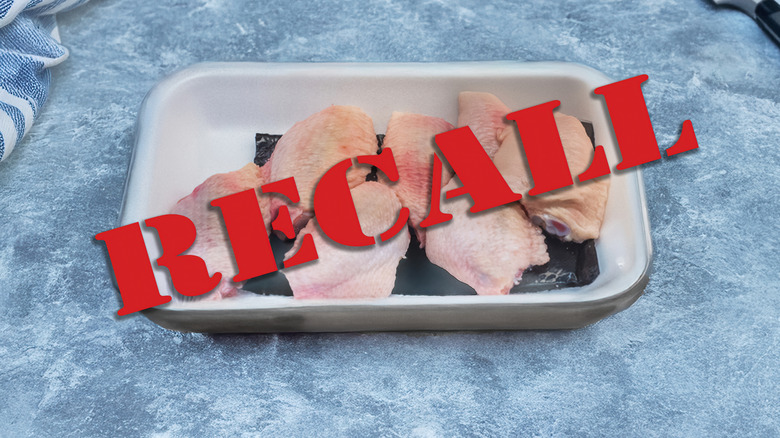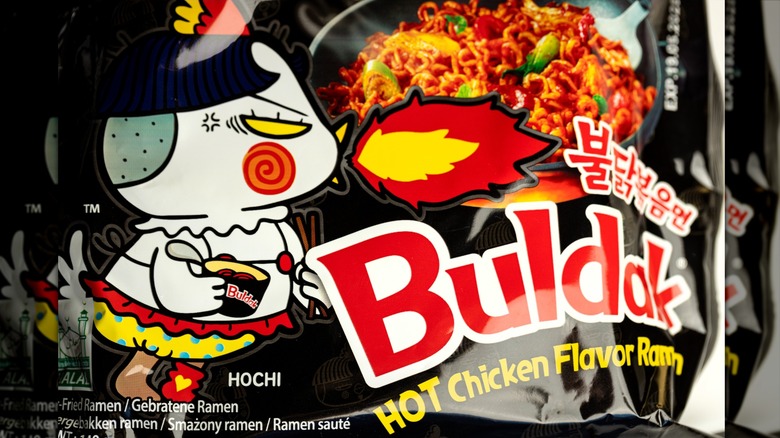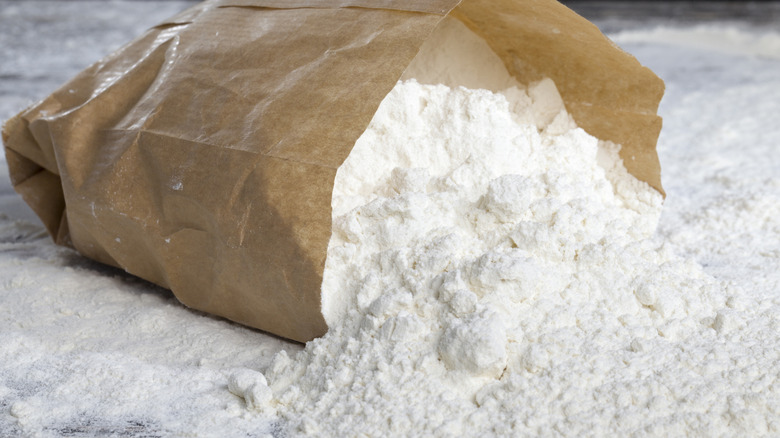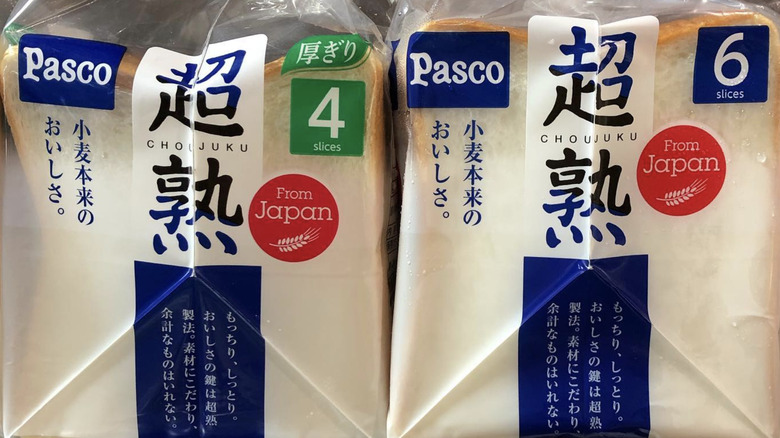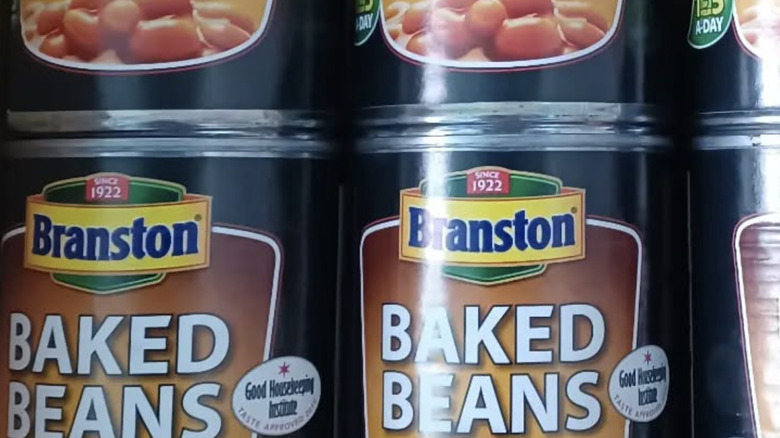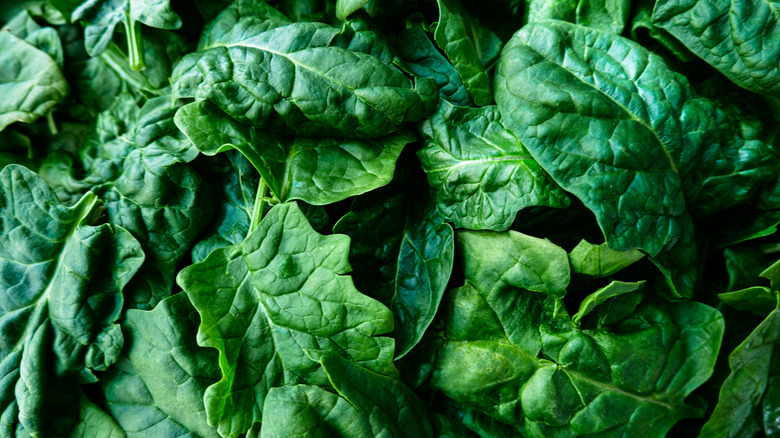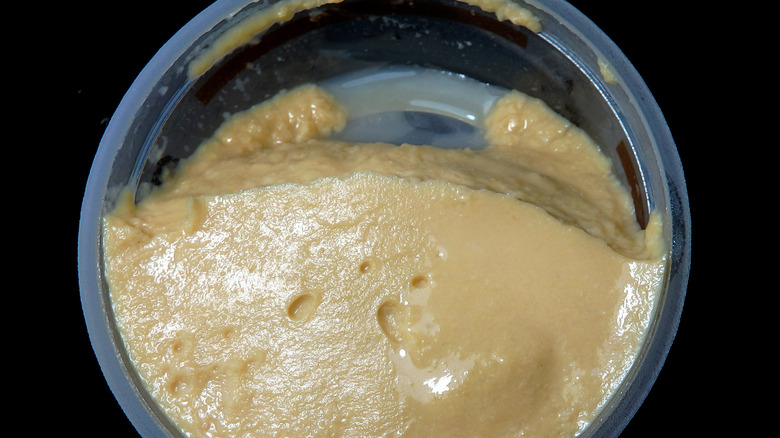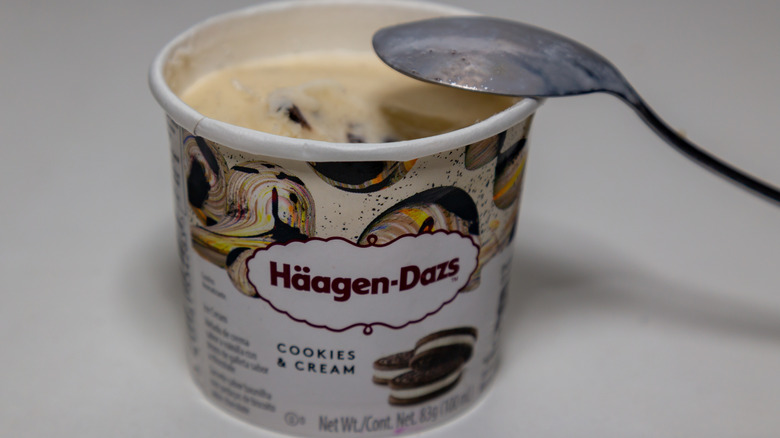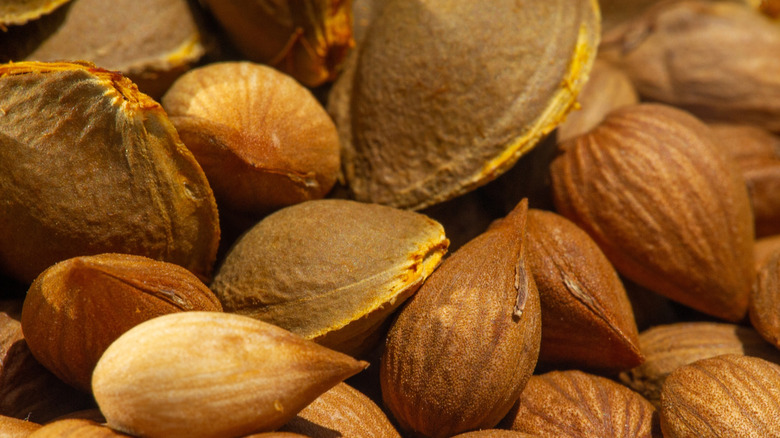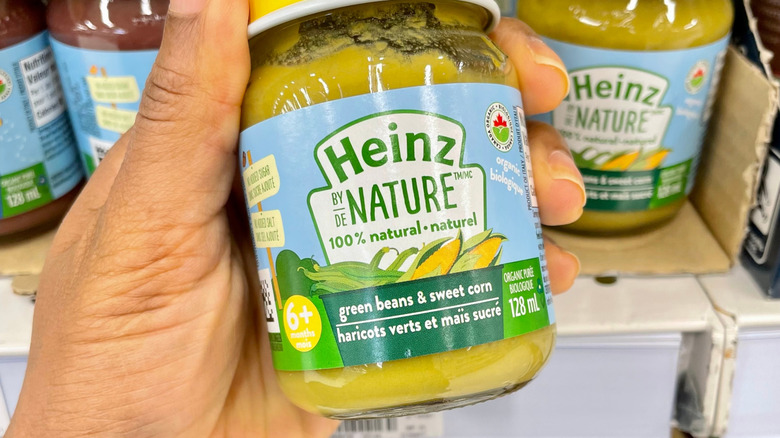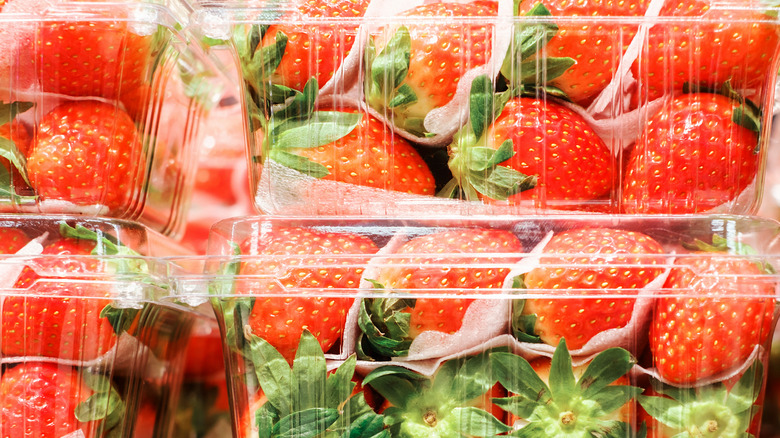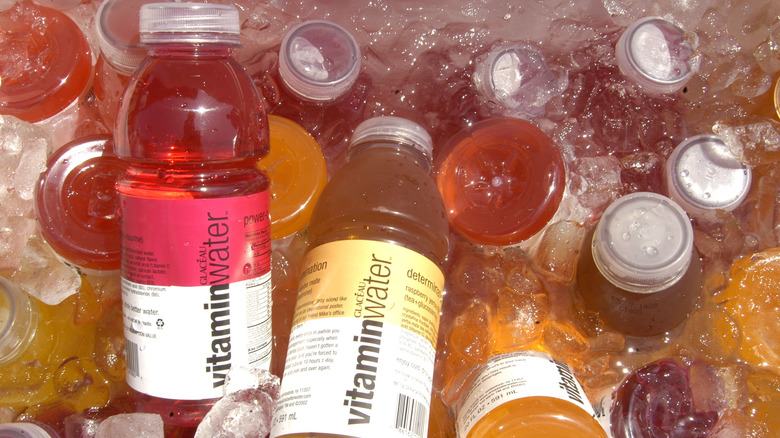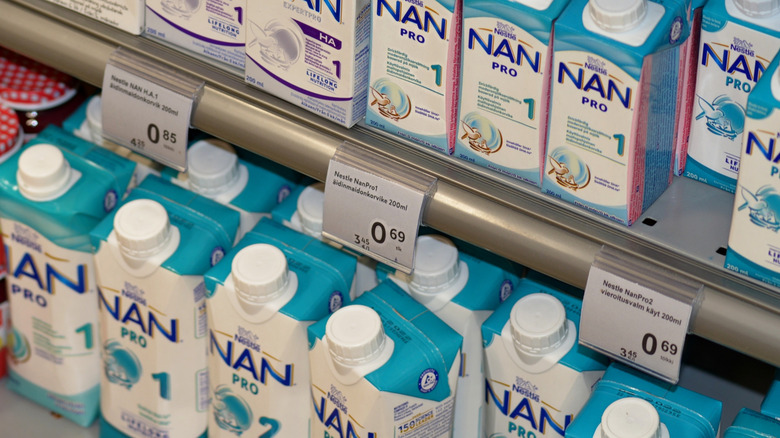The Strangest International Food Recalls In History
Food recalls have become super-common, but that doesn't make them any less serious. In many cases, the circumstances behind food recalls are scary, and they're occasionally pretty gross too. Other times, food recalls are mind-bogglingly strange. We're not just talking about recalls that have gone down in the U.S. either — the recalls that made this list took place on international soil.
Few things can make you lose your appetite quicker than finding an object in your food that's not supposed to be eaten at all. The presence of foreign matter in food is one of the most common reasons why products get recalled. Often, the object is plastic or metal (or glass, eek!), but sometimes the material lurking in your lunch is so bizarre, you can't help but wonder what on earth is happening at the factory where the food was produced.
Misdeeds at food manufacturing facilities are the dominant reason behind history's strangest food recalls, but they don't explain everything. Some foods have been recalled because the concepts behind their creation were flawed from the start. Human error is responsible for every food recall in one way or another, and these were some of the world's weirdest.
Buldak Noodles in Denmark (2024)
South Korean-imported Buldak ramen was a little too hot to handle for the people of Denmark — at least according to the country's food authorities. In 2024, three spicy ramen varieties were recalled because health officials considered them high risk for "acute poisoning." Buldak ramen is produced by Samyang Foods, one of South Korea's biggest food manufacturing companies. Buldak is sold all over the world, but its international popularity didn't have Denmark convinced.
Hot Chicken, 2x Spicy Hot Chicken, and 3x Spicy Hot Chicken, were the Buldak ramen flavors included in the recall. These flavors rely on high amounts of capsaicin, the spice-inducing chemical that gives chili peppers their heat. The Danish Food and Drug Administration noted that capsaicin contains neurotoxic properties that can be hazardous to health. A likely motivation to recall Buldak ramen's spiciest offerings was the effect the soup was having on Denmark's impressionable youth.
Kids and teens in the Scandinavian nation were challenging one another to social media dares to eat the super-spicy ramen, and the trend was worrisome. Scandinavia is known to impart some of the strictest food regulations in the world, banning many chemicals and additives commonly found in processed foods in other nations. Buldak didn't take much offense to its fiery-flavored ramen getting the axe up north. "We will closely study local regulations while responding to this recall measure," the company said in an official statement (via AP News).
Paint in flour in Canada (2024)
The flour selection in Québec got a little thinner in 2024 for a reason no one could have predicted. Québécois flour brands Le Moulin des Cèdres and Les Produits Agrobio issued a recall for multiple flour products in May 2024 because pieces of paint were found inside. The Class II recall was overseen by the Canadian Food Inspection agency. The flour in question was supplied to hotels, restaurants, and retail stores throughout the province.
Press and consumer outcries related to this strange recall were quiet, so quiet that the colors of the paint pieces were never publicly disclosed. Organic unbleached flour, all-purpose flour, and organic bread flour were all whisked off of shelves when the recall hit. No known records of illnesses were ever connected to this uncanny recall, but we bet Le Moulin des Cèdres and Les Produits Agrobio have been sifting through their flour supply more carefully since then.
Pasco Shikishima sliced white bread in Japan (2024)
When Pasco Shikishima Corporation recalled 104,000 packs of sliced white bread in May 2024 due to contamination from rat remains, the news wasn't just strange (and vile), it was outright shocking. Pasco is a trusted household name in Japan, a nation whose high cleanliness standards are applauded worldwide. The story of a rat creeping onto the assembly line at Pasco's Tokyo factory, getting chopped up by industrial bread-slicing machinery, and being packaged inside loaves of white bread made international headlines.
Pasco, a multi-nation bread exporter, didn't reveal a play-by-play of the rat's dance with death in its factory, but assured the public that production had been suspended and a probe into the incident was underway. Some details of what led to the recall did come to light. The eviscerated remains of a black rat (who appeared to have acted alone) were discovered inside at least two packets of Pasco Chojuku Yamagata sliced white bread. Pasco learned of the incident after two customers emailed the company over what they found.
"We would like to apologize deeply for causing trouble to our customers and clients," Pasco said in a widely publicized statement. "We will strengthen our quality management system to ensure there won't be a recurrence." The mind picture of a hairy rat carcass sandwiched between pillowy slices of white bread isn't the easiest to shake, but Pasco seems to have risen above it. The company continues selling its famous bread all over the globe.
Princes Group Baked Beans in the U.K. (2023)
A great many cans of baked beans bounced from stores in the U.K. in 2023 after a very unexpected addition made its way inside — rubber balls. A recall was issued for baked beans, one of Britains most beloved foods, sold at Asda, Sainsbury's, and Tesco grocery stores to name a few. The rubber balls were approximately 1 inch in diameter and presented a major choking hazard to consumers. The recalled products ranged from cans of Mixed Bean Salad sold under store brands Asda and Tesco, Baked Beans in Tomato Sauce from Asda and Branston brands, and Baked Beans & Pork Sausage in Tomato Sauce from Tesco and Sainsbury's.
All of the contaminated bean products were manufactured by Princes Group, a global exporter of food and drink based in the U.K. Product recall notices went out to all of the grocery stores where the afflicted products were sold. Princes Group assured consumers that the cans could be returned at the place of purchase without a receipt, but didn't offer any explanation for why something so peculiar was hiding beneath the beans. To this day, the reason remains unknown.
Hallucinogenic spinach in Australia (2022)
Have you ever eaten a salad and thought, "whoa, this baby spinach is tripping me out"? Neither have we, but some folks in Australia can't say the same. In December 2022, Riviera Farms, a well-established grower in the southeastern state of Victoria, was implicated in one of the most unusual recalls in history. Authorities launched an investigation into store-bought baby spinach after over 100 people reported feeling delirious or even hallucinating after eating the leafy vegetable. Investigators suspected that a toxic plant had gotten mixed into spinach packages.
Once the contaminated greens were traced back to Riviera Farms, all of its baby spinach products were recalled and the grower, aided by Victorian health officials, began testing other plants on the property. The public was advised that along with hallucinations and delirium, symptoms from the contamination could include a flushed face, dilated pupils, rapid heartbeat, dry mouth and skin, and fever. As the illness count reached over 160 and dozens of individuals sought medical treatment, the farm's contamination source was identified as thornapple, a weed plant in the nightshade family.
Thornapple was a neighboring crop on the premises whose leaves may have kinda looked like baby spinach if harvested when both plants were young. Riviera Farms' reaction to the health scare was apologetic yet optimistic. "By the time Riviera Farms baby spinach is re-introduced to market, it will be the safest, most audited spinach supply in Australia," the company pledged in a public statement (per The Guardian).
Harvey & Brockless Fine Food Company in England (2022)
An unexpected turn of events put Harvey & Brockless Fine Food Company's reputation on the line in 2022. It also resulted in multiple product recalls and an arrest. On October 28, 2022, Harvey & Brockless began receiving reports that dozens of its products, including tubs of hummus and salad dressing, were tainted with peculiar, non-edible items like rubber gloves, plastic bags, and metal pieces. Harvey & Brockless, which supplies specialty goods to numerous restaurants including international chicken chain Nando's, was unnerved.
The company began tracking down every contaminated product and launched an internal investigation. Since Harvey & Brockless goods are run through a metal detector before exiting the kitchen, scrutiny turned to employees assigned to the facility's storage area. This suspicion proved correct. Camera footage showed late night employee Garry Jones mixing a suspicious substance into raw ingredients he was supposed to be prepping for next-day production. The camera also caught him spitting into a container of dip. Jones, then aged 38, was arrested. During police questioning, he confessed.
In addition to submerging factory supplies into hummus and dressing, Jones admitted to mixing fish sauce with soy sauce on one occasion, creating a serious allergen risk for unwitting consumers. Jones also disclosed breaking into a colleague's home and stealing a pink hairbrush. In 2023, Jones received a 33-months prison sentence for food tampering and a nine-month sentence (to be served consecutively) for the break-in and hairbrush burglary.
Pesticide-laced Häagen-Dazs in the European Union (2022)
The absence of Häagen-Dazs in the European Union (EU) left a bitter taste in August 2022. The widespread recall was initiated when the Food Safety Society Authority learned that some Häagen-Dazs ice creams contained 2-chloroethanol, a residual product of the fumigant pesticide ethylene oxide (ETO). Foods containing ETO have been banned in the EU since 1991. Although 2-chloroethanol is a known byproduct of ETO, Häagen-Dazs didn't put the pesticide in its ice cream.
So what was the problem? A risk assessment conducted by the German Federal Institute for Risk Assessment (BfR) determined that occurrences during the production process such as cross contamination or reactions from other chemicals containing chlorine could explain 2-chloroethanol's presence in food not treated with ETO. BfR's findings didn't have much sway. Massive amounts of American-owned Häagen-Dazs ice cream continued to be sold throughout the EU.
Flavors affected by the initial recall were Belgian Chocolate, Duo Belgian Chocolate & Strawberry Crunch, Cookies & Cream, and Pralines & Cream. In Belgium, the recall expanded to include 17 Häagen-Dazs products. The Food Safety Society Authority noted that the recalled ice creams didn't pose an immediate public health risk, however, consumption of banned pesticides — including their residual chemical byproducts like 2-chloroethanol — could affect one's health over time due to their known mutagenic and carcinogenic effects. Representatives from Häagen-Dazs' parent company General Mills, attributed the 2-chloroethanol inside the ice cream to vanilla extract from one of its suppliers.
A cyanide-causing substance in apricot kernels in Canada (2021)
In 2021, Canadian apricot kernel manufacturers got a crash course in food science when various brands of the health store staple were recalled because they might cause cyanide poisoning. A year earlier, Health Canada revamped safety standards surrounding the consumption of apricot kernels (sometimes called vitamin B17), due to the amygdalin that naturally occurs within them. Amygdalin is a molecular compound found in apple and lemon seeds, almond kernels, and the kernels inside the pits of apricots, cherries, peaches, and nectarines. When ingested, amygdalin converts to cyanide in the small intestine.
The human body is able to detoxify cyanide in small amounts, but too large a dose can prove fatal. Under Canada's new federal standards, the amount of extractable cyanide in apricot kernels being sold as food could not exceed 20 parts per million (ppm). In March 2021, an apricot kernel recall wave affected every Canadian province. Holistic brands like Apricot Power, Earth Notions, Natural Herbs Trading Co., and Harmonic Arts Botanical Dispensary had products pulled from distribution for excessive amygdalin levels.
The link between apricot kernels and cyanide poisoning is one of nature's mysteries. Canada's sweeping precautions to prevent consumer illness or death was years in the making. One man's hospitalization for cyanide poisoning in 2017 after eating Organic Traditions apricot kernels purchased in Montréal prompted calls for Canada to ban the sale of the "superfood" altogether.
Metal shards in baby food in the U.K. (2019)
An English sheep farmer's two-year blackmail plot against Tesco prompted the supermarket mega-chain to recall 42,000 jars of baby food in 2019. The farmer was 45-year-old Nigel Wright and his plan to harm infants via baby food tampering almost worked. Wright sent Tesco dozens of threatening letters and emails, claiming to represent a group of farmers disgruntled by the cheap price of milk. In reality, he was acting alone.
Wright demanded Tesco pay him £1.4 million in bitcoin cryptocurrency or the chain's baby food supply would be laced with razor blades. "Imagine a baby's mouth cut open and blood pouring out, or the inside of their bellies cut and bleeding. You pay, you save them," he wrote in one correspondence (via The Guardian). Wright acted on his threats. A mother in Lockerbie, Scotland was feeding Heinz Sweet and Sour Chicken baby food to her 10-month-old child when she spotted something shiny and pulled it out just in time. A mother in England discovered metal shards in Heinz baby food purchased from Tesco that she intended to feed her nine-month old.
Tesco's security cameras caught Wright placing contaminated jars of baby food on a shelf, then buying more baby food jars (plus flowers for his wife and a bottle of wine). In October 2020, Wright was sentenced to 11 years in prison for his crimes. He earned another three years for blackmailing a driver for bitcoin payment during a road rage incident.
Strawberries in Australia and New Zealand (2018)
A strange and scary food recall rocked Australia and New Zealand in September 2018 when multiple brands of strawberries were recalled because sewing needles were embedded inside the fruit. News of the situation arose after a seven-year-old girl noticed a needle in a strawberry and a man who ate a strawberry with a needle in it had to be hospitalized. Days later, over 100 individuals reported finding needles in their strawberries.
Shaken by these revelations, Australian strawberry brands like Berrylicious, Berry Obsession, Delightful Strawberries, Donnybrook Berries, Love Berry, Mal's Black Label, and Oasis cleared their strawberries from store shelves. In Australia and New Zealand, supermarkets including Aldi, Coles, Countdown, and Foodstuffs removed Australian-grown strawberries from circulation. It was peak strawberry harvesting season in the region, yet growers were dumping thousands of kilograms of product.
Amidst looming fears that these findings were inspiring copycat cases, Woolworth's, the parent company of Countdown Supermarkets, suspended its sale of sewing needles. Meanwhile, the Australian government increased the maximum prison sentence for fruit tampering to 15 years. In November 2018, a 50-year-old Australian woman named My Ut Trinh was arrested in Queensland and charged with seven counts of contaminating goods. Trinh was a former supervisor at Berrylicious farms and it was alleged that she tampered with the strawberries out of spite. In July 2021, all charges against Trinh were dropped.
Vitamin Water in Canada (2013)
Vitamin Water's Canadian marketing team veered sharply off course in 2013 with some very poorly-worded messages. Cheeky text under bottle caps is nothing new and customers seem to like it — well, unless somebody from Vitamin Water came up with it. In September 2013, Blake Loates of Edmonton, Alberta grabbed a bottle of Vitamin Water while out to eat. When she opened it, the message inside the cap included an offensive slur.
Loates was convinced the message had been printed by someone at the bottling facility who was angry or thought it was funny. She showed the cap to her father, the parent of a special needs child, who then typed out a deeply personal, strongly-worded letter to the Board of Directors at Vitamin Water's parent company, Coca-Cola. Coke's head honchos knew better than to let this emotionally-charged complaint go unacknowledged, and a representative contacted the Loates family to explain.
Apparently, the message was part of a Vitamin Water promotion in Canada that encouraged the public to submit a word of their choice in French or English. The selected words in each language were randomly paired together and printed inside the bottle caps. For the non French-speakers out there, "retard" in French means "late" or "delayed" and does not carry a derogatory connotation the way it does in English. The mishap was an embarrassing one. Coke destroyed the remaining "random words" bottle caps and recalled the remaining products related to the promotion.
Nestlé Baby Milk in multiple European countries (2005)
When you hear about milk recalls you probably think, "bacteria contamination" or "undeclared allergen", but certainly not "printer ink." Sure enough, printers were the havoc-wreaking force behind the great Nestlé Baby Milk recall of 2005. Trouble arose in July 2005 when product testing of Nestlé Ready-To-Feed liquid formula in Italy showed a positive result for IsopropilThioXanthone (ITX), a chemical used as a photo inhibitor in UV-cured inks on food labels. The ink was supplied by TetraPack of Sweden.
The Italian health ministry notified Nestlé, but didn't alert the EU commission for almost two months. Once a recall was issued in Italy, Spain followed suit. The ITX-contaminated milk cartons were produced in The Netherlands, then filled in Spain. Media reports alleged that 30 million liters of Nestlé baby milk were subject to the recall, yet recalled products didn't come off of store shelves until late October 2005.
Despite Nestlé CEO Peter Brabeck's claim that the Italian Health Ministry gave him permission to sell the contaminated stock (Italian health officials vehemently denied this), and that the type of printing on the labels was changed in October, Nestlé baby milk was pulled from circulation in France, the French territory Réunion, Portugal, and Greece . The European Food Standards Agency (EFSA) concluded the matter by saying the ITX levels were undesirable but unlikely to cause health problems, though if the levels found in the baby milk persisted, more testing would be needed.
